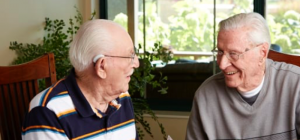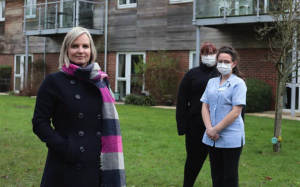
Part Three: Paralanguage
“They won’t remember what you said, but they will remember how you made them feel”
Carl W. Buechner
When any of us communicate with a person living with dementia, we will both be using non-verbal ways to communicate beyond the words.
These unconscious methods of exchange: body language and paralanguage, may be overt or subtle, but they are always part of the mix. They help to reinforce what the other person — or we are saying and help us to understand one another better.
Can we cross into the world of the person living with dementia, with all its confines and limitations, rather than expecting them to fit into ours?
Our own reactions may inadvertently add to the person’s lack of mental capacity. I have witnessed many conversations between a person with dementia, a caregiver and another, where the caregiver answers on behalf of the person, or completes their sentences for them — all meant kindly, with no intent to harm, but disabling to the person they care for, nonetheless.
For a person with dementia, feelings are often uppermost. In situations in which they feel fearful, anxious, bored, confused, frustrated, in pain or angry, the feelings of isolation and/or helplessness that the person experiences may find different outlets. The words they then use may not relate to the actual conversation, but instead, include those that reflect familiar, well-rehearsed social norms, or those that transmit their fear, dissatisfaction or frustration at the challenges they are facing.
A person might even swear, despite their normal good manners. They may use paralanguage to communicate their feelings, bypassing words altogether, meaning that petulance, physical force, annoyance or anxiety spill over; or conversely, they may retreat into detachment and passivity.
“The single biggest problem in communication is the illusion that it has taken place.”
George Bernard Shaw
Caregivers often develop highly nuanced paralanguage skills with those they care for, in order to stay more in tune with them.
When a caregiver enters into the person’s perceptual world with attentive observation, curiosity and empathy, the effect of and feelings about what is happening matter more than the words spoken. Let’s call this “super-awareness”. This deeper engagement makes it easier to identify, understand, respond to and reduce behavioural expression that has been created by negative, uncomfortable feelings.
Those who listen keenly, observe astutely, mirror accurately and understand thoughtfully, can assist in enabling the paralanguage of a person living with dementia, empowering the person to communicate and participate more effectively and make their lives more meaningful as a result.
We need to understand how challenging it can be for a person living with dementia to understand and relate; and how disempowering it is for the person to be judged from a purely cognitive viewpoint.
The heart of good caregiving means being super-aware and being able to “read the person” accurately. To do this well, we need to be present, listen not only with our ears but also with our eyes and nose. Above all perhaps, we need to listen with an openness to hear beyond the words the person is saying. It is only then that we become thoughtful enablers for them, to nourish and enrich their lives.





No comment yet, add your voice below!